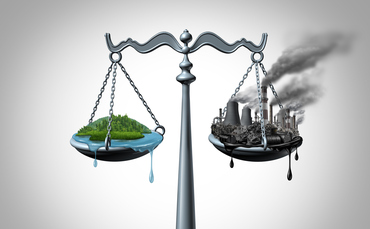The number of ‘climate litigation’ cases against companies is on the rise, according to a new analysis published today by the Grantham Research Institute on Climate Change and the Environment at the London School of Economics and Political Science.
Defined by the authors of Global trends in climate change litigation: 2024 snapshot as “examples of strategic litigation which appears to seek to advance a broader climate action agenda”, these cases have historically been brought against governments. But the report highlights how legal action relating to climate change is increasingly also being targeted at corporates.
While just 15 per cent of climate cases filed in the US – the country with the highest number of documented climate cases – were against companies, the share climbed to 40 per cent across the rest of the world.
The report found that some 230 climate-aligned lawsuits have been initiated against corporations and trade associations since 2015, with more than two thirds filed since 2020.
Overall, the report found 233 cases were filed in total during 2023, up by 11 cases on the previous year, but still more than 30 cases shy of the 266 climate-related legal actions filed in 2021. The US had the highest number of cases with 129, followed by the UK with 24. Brazil, Germany, and Australia recorded 10, seven, and six cases, respectively.
Climate litigation cases also spread to new countries last year, with cases filed for the first time in Panama and Portugal, bringing the total number of countries in which climate cases have now been recorded to 55.
The Grantham Research Institute also confirmed that climate cases in the Global South are increasing, with the analysis noting over 200 climate cases from these countries – comprising around eight per cent of all cases to date.
However, the US remains the main focal point for climate litigation with 1,745 climate cases brought since the Paris Agreement. Australia was a distant second place in the league table, with 132 cases identified.
Broken down by case type, the 2024 snapshot found that 47 new cases were filed in 2023 against companies and governments over alleged ‘climate washing’, which refers to false or misleading claims relating to climate impacts or policies. More than 140 such cases have been filed to date, making it one of the most “rapidly expanding” areas of litigation, the report’s authors claimed.
More than half of the nearly 140 ‘climate washing’ cases reviewed between 2016 and 2023 have reached official decisions, with 54 of these 77 cases concluded in favour of the claimant.
The Grantham Research Institute also revealed further developments in ‘polluter pays’ cases in 2023 with more than 30 cases worldwide seeking to hold companies accountable for climate-related harm allegedly caused by their greenhouse gas emissions.
The authors also identified six ‘turning off the taps’ cases, which aim to challenge the flow of finance to projects and activities not aligned with climate goals, with 33 such cases filed since 2015.
In addition, the report confirmed there were nearly 50 cases filed in 2023 that targeted climate policies. These cases included so-called ‘backlash litigation’ against environmental, social and governance policies, “just transition” cases challenging the distributional impacts of climate policies, and “green v. green” cases concerning potential trade-offs between climate and biodiversity impacts.
The report acknowledged climate litigation is proving increasingly controversial in some quarters.
Advocates of legal action – such as the recent case against the UK government over its Carbon Budget Delivery Plan or the human rights case brought against the Swiss government over its climate strategy – have argued that the approach ratchets up pressure on policymakers and businesses to deliver more ambitious climate action. But critics have accused courts of judicial over-reach and argued cases can distract from the need to deliver effective decarbonisation policies. There have also been concerns that cases focused on alleged ‘greewashing’ can trigger ‘greenhushing’, whereby businesses simply stop promoting their climate policies for fear of being sued.
“Whether climate litigation is advancing or hindering climate action remains difficult to determine,” the report authors concluded. “Some types of cases, such as government framework cases, have already had lasting impacts on domestic climate governance. However, the long-term implications of other case types, such as climate-washing cases, remain unclear, despite the relatively high levels of ‘successful’ cases in the courtroom.”
The analysis was based on a dataset containing 2,666 climate litigation cases compiled by the Sabin Center for Climate Change Law at Columbia Law School – around 70 per cent of which have been filed since the Paris Agreement was adopted in 2015.
Last year’s snapshot detailed an “explosion” in legal challenges against corporate climate commitments, claims about product attributes, overstated investments or support for climate action, and failure to disclose climate risks, with case numbers almost trebling since 2020.
More recent studies have also claimed that almost two-thirds of senior leaders at large UK companies are concerned their environmental, social and governance targets could put them at risk of litigation, and that current frameworks for measuring climate-related financial risk are failing to properly assess litigation risks.
Keep up to date with all the latest green business news by signing up to the free Daily and Weekly BusinessGreen Newsletters.

